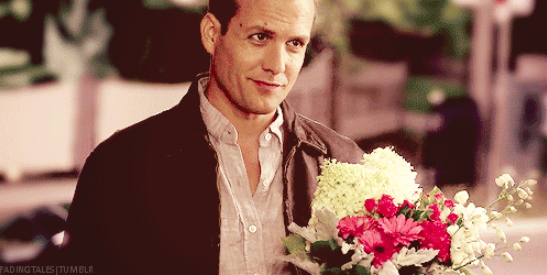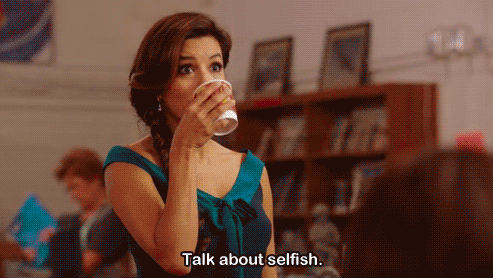Hindsight is always 20/20.
Relationships can be tough. Sometimes it feels like you're doing them right, and other times it feels like literally everything is falling apart, and you're the reason behind it.

It’s unfortunate, but most of the time, you don’t realize how your behaviors damage your relationships until it’s too late. So we spoke to Irina Firstein, a couples therapist in New York City, to learn more about the different ways people unknowingly sabotage their relationships, and which steps they could take to prevent these things from putting a strain on their love lives.
Alright, take out your pencil and notebook — you may want to take some notes.
FOX / Via huffingtonpost.com
You always assume the worst-case scenarios are true.

So maybe you haven’t had the best relationship experiences. The pain that those caused can make you feel like it’s better to err on the side of caution going forward, closing yourself off from your partner, or they might influence the trust and faith that you have in your partner or the relationship. Constantly thinking that your relationship is at risk of failing isn’t healthy and can influence you to behave in ways that are detrimental and keep you from have having a happy relationship, Firstein tells BuzzFeed Health.
“If every time your partner is gone for a while or takes a while to respond to a text, you’re coming to catastrophic conclusions such as they must be cheating on you or not interested in the relationship anymore, it’s definitely going to create problems that otherwise may not have existed,” she says.
However, you don’t want to not care at all about where they are or what they’re up to, she says — there’s a spectrum, and that it’s best to be somewhere in the middle. TL;DR: You don’t want to assume that it’s always the worst-case scenario, but you also don’t want to be so comfortable in the relationship that you don’t think about them at all.
New Line Cinema / Via gfycat.com
You prioritize everything else in your life because you think your relationship isn’t going anywhere.

When you really like someone, more often than not you’ll do whatever it takes to show that person you care, and make them feel special and important, so that they know how good the relationship can be. But as the relationship becomes more secure — it gets more serious, or you move in together, become married, or have kids — your priorities may change.
“When people get comfortable, they think they don’t need to do anything to maintain the relationship anymore,” Firstein says. “They get lazy and complacent. They don’t think about romance, emotions, and fostering that relationship and connection, and prioritize everything else in their lives. If you did that with a job, you’d get fired.”
She says it’s important to not take your partner for granted. It’s tempting to only prioritize work, kids, friends, etc. when you feel like you have such a secure relationship. But neglecting someone can be the fastest way to lose them, she explains.
MTV / Via giphy.com
You put meaning and motive behind the things your partner says or does.

Your brain wants to protect you from getting hurt or being taken advantage of (amen!). But these defenses can go too far, encouraging you to look for selfish motives behind why they are saying or doing nice things for you — there’s no way they’re ~fooling~ you with those romantic gestures. But overthinking your partner’s every single move, in the hopes of outsmarting them, is only going to hurt your relationship, Firstein says.
“There’s a motivation for everything that we do. When someone does something nice, they do it because they want something good to be happening. The motivation is good, whether it’s sustained or not,” she explains. “Why question a good deed? It’s important to look for what’s good in the moment, and accept it for what it is.”
If they say “I love you,” listen to them. Don’t just assume they’re saying it because they want something from you. Firstein recommends being appreciative of the things your partner says and does for you — don’t belittle their actions or put your own thoughts in their head.
USA Network / Via fadingtales.tumblr.com
You play the ~blame game~ because your partner is an easy target.

It’s hard to take responsibility for your actions and life problems when things aren’t going your way, and it can be tempting to blame your partner for the things you’re upset about. Why? Because when you’re comfortable, you assume your partner will love you unconditionally, and that there will be minimal repercussions, Firstein explains.
“Clients have said things like ‘I put on 10 pounds because you’re driving me crazy,’ ‘I'm so stressed because you don’t do anything you say you’re going to do,’ and ‘My relationship with my mom is awful because she hates you,’" she says. "It’s an easy fallback position for tough situations you find yourself in. Making a habit of this behavior is extremely destructive and will result in your partner feeling bad about themselves and eventually resenting you.”
Instead, she recommends sitting down and being honest with yourself about why you’re not happy and why things are difficult. Ask yourself, What am I doing to contribute to this? Don’t just blame it all on someone else.
VH1 / Via giphy.com
You think it’s not safe to talk about or bring up the things that are bothering you.

Holding in your feelings and waiting for your problems to resolve themselves is problematic because those issues will grow bigger and more serious until, one day, they’re much more difficult to address and take care of, Firstein says.
“It may seem beneficial to keep your negative feelings in so you don’t stir the pot — so that you’re keeping the peace,” she explains. “But those feelings don’t just go away. They will come back over and over, and it’s just so much healthier for a relationship if you deal with them earlier on.”
Disney / Via giphy.com
You keep a running score of who’s right or wrong.

It’s tempting to get frustrated during arguments and say things like, “Yeah, well remember all the times you did this to me?” But while, things in the past aren’t forgotten, and it’s okay to bring things up as a way to heal, Firstein says you should try your best to not use them as a weapon to hurt someone or get the “upper hand” in an argument.
“There shouldn’t be a winner or loser when it comes to arguments,” Firstein explains. “Instead of tallying up who’s right or wrong, you should be listening to your partner’s underlying feelings and addressing them. You may not feel like your partner’s feelings are justified, but they feel that way for a reason, and talking that through together is what’s important.”
Warner Bros. Pictures / Via tenor.com
You put negative labels on your partner.

Calling your partner “lazy” or “selfish” can be incredibly detrimental to a relationship.
“It boxes people in and puts labels on them,” she says. “It makes your partner feel that’s how you think of them all the time, even when they’re not being lazy or selfish — like they have no positive qualities. It will create resentment and angry feelings. No one wants to be told they’re a ‘bad’ person.”
Look, we’re all human, and sometimes we feel so exasperated that we end up saying things we don’t mean. If you’re really angry and something slips out, it’s better to wait until things are a little bit calmer so that you can be more careful and deliberate about how you speak to them. This is also when you should try to make amends, Firstein advises. Try to make sure you apologize and acknowledge that what you said wasn’t okay.
ABC / Via meangirlgifs.tumblr.com
You hold your partner or your relationship to unrealistically high expectations.

If you are basing your expectations for what a relationship “should be” or how a partner “should act” on what you see in movies, TV shows, books, or, even worse, on social media, then you’re only going to set yourself up for disappointment.
“There’s always going to be some level of conflict and growth,” Firstein says. “Holding your partner to ridiculous standards will make it impossible for them to meet and impossible for you to find your ideal happiness. People aren’t always going to be honest about their relationships on public social media platforms, so don’t just assume those couples aren’t going through things that you do.”
Netflix / Via giphy.com
You assume your partner knows, or ~should~ know things.

“Using the word ‘should’ is patronizing and condescending, which immediately makes things adversarial,” Firstein says. “Don’t say, ‘You should know how I feel.’ Instead, be like, ‘I would like you to understand that I’m upset about this.’ ‘It’d be good for you to know that this is something that’s been bothering me.’”
Telling your partner what they should or shouldn’t know is self-aggrandizing, and makes it look like you’re all knowing and that everything is black and white, with no in-between, she says.
ABC / Via reactiongifs.me
You think that in order for the relationship to be “right,” the both of you have to be willing to devote all your time and energy to each other.

“Yes, you want to make sure your partner is always a priority — the same way you’d hope you’re always a priority of theirs. But there are other things in life, besides your relationship that are important — work, family, friends, your living space, school, etc. — and it’s okay to make time for those things too,” Firstein says.
It’s not an all-or-nothing kind of deal. “Your partner doesn’t need to give you all of themself all the time in order to prove that the relationship is healthy and happy.”
CBS / Via giphy.com
Remember, everyone makes mistakes. This shit is not easy, but you can do it!

FOX / Via giphy.com
from BuzzFeed - Health http://ift.tt/2DZ0DH1
via IFTTT